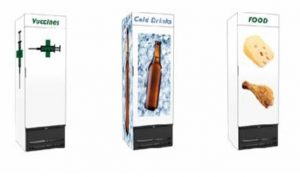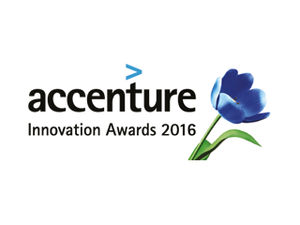 Meet Maarten ten Houten, Founder and CEO of Coolfinity, a social enterprise that brings innovative and sustainable cooling solutions to countries with power infrastructure challenges. In 2015, Maarten and I worked together on crafting an ecosystem of many different organizations to ensure Coolfinity’s first product, the Icebank Cooler, can be used for food, beverages and healthcare use. This product has been nominated for an Accenture Innovation Award, so high time to reconnect and hear from him on the unstoppable energy transition, business as the change agent and cooling as a pillar of civilization.
Meet Maarten ten Houten, Founder and CEO of Coolfinity, a social enterprise that brings innovative and sustainable cooling solutions to countries with power infrastructure challenges. In 2015, Maarten and I worked together on crafting an ecosystem of many different organizations to ensure Coolfinity’s first product, the Icebank Cooler, can be used for food, beverages and healthcare use. This product has been nominated for an Accenture Innovation Award, so high time to reconnect and hear from him on the unstoppable energy transition, business as the change agent and cooling as a pillar of civilization.
Abundant innovation for change
 We all see the doom and gloom stories in the news on climate change, biodiversity and resource depletion, but I’m actually quite optimistic. More than ever before, we have both insight into the issues and access to relevant innovation to address them. If we focus on seriously addressing the core issues, transformation to a more sustainable future could happen quite quickly. Just consider how fast we’ve embraced cell phones, or how quickly we were able to transform to highly effective war economies during both World Wars. The energy transition is well on its way. The big innovations we need are available and as they scale up, they become cheaper and cheaper. It’s not easy to drive this transition, but the required societal behavior change is limited. Interestingly, even Saudi Arabia is investing in solar energy. This transition will happen, it can no longer be stopped.
We all see the doom and gloom stories in the news on climate change, biodiversity and resource depletion, but I’m actually quite optimistic. More than ever before, we have both insight into the issues and access to relevant innovation to address them. If we focus on seriously addressing the core issues, transformation to a more sustainable future could happen quite quickly. Just consider how fast we’ve embraced cell phones, or how quickly we were able to transform to highly effective war economies during both World Wars. The energy transition is well on its way. The big innovations we need are available and as they scale up, they become cheaper and cheaper. It’s not easy to drive this transition, but the required societal behavior change is limited. Interestingly, even Saudi Arabia is investing in solar energy. This transition will happen, it can no longer be stopped.
Yet barriers remain for social and material change
 What’s more challenging is the systemic change needed on how we manage materials and natural resources. Most physical products are designed for the dump. They are constructed in a way that doesn’t allow parts to be repaired or recycled efficiently, which is needed to create a circular economy. In order to “keep products, components, and materials at their highest utility and value at all times” we need to design, assemble, use, collect and disassemble products in a different way. This calls for a totally new design approach including all actors in the value chain. Co-creation is key, which will certainly create new bottlenecks and frustration. This type of change cannot be done by one company in isolation, it really requires a redesign of the (eco)system in which companies and governments operate. Usually, a manufacturer, recycler and maintenance company don’t speak to each, so to start collaboration, a certain level of trust and a common language is needed. That’s what I like about the circular economy movement, it provides a common language for parties to build the trust needed for collaboration.
What’s more challenging is the systemic change needed on how we manage materials and natural resources. Most physical products are designed for the dump. They are constructed in a way that doesn’t allow parts to be repaired or recycled efficiently, which is needed to create a circular economy. In order to “keep products, components, and materials at their highest utility and value at all times” we need to design, assemble, use, collect and disassemble products in a different way. This calls for a totally new design approach including all actors in the value chain. Co-creation is key, which will certainly create new bottlenecks and frustration. This type of change cannot be done by one company in isolation, it really requires a redesign of the (eco)system in which companies and governments operate. Usually, a manufacturer, recycler and maintenance company don’t speak to each, so to start collaboration, a certain level of trust and a common language is needed. That’s what I like about the circular economy movement, it provides a common language for parties to build the trust needed for collaboration.
Business in the driver’s seat for change
 Business has the best cards for driving the social and material change we need. They have the ability to organize anything, they’re efficient and can deliver on different agendas. The question is: who will set the roadmap for the future towards a more circular economy? Hopefully this will be a coalition of the willing with business, governments and academia working together. As a social entrepreneur, I’m keen to contribute to the roadmap, and lead by example.
Business has the best cards for driving the social and material change we need. They have the ability to organize anything, they’re efficient and can deliver on different agendas. The question is: who will set the roadmap for the future towards a more circular economy? Hopefully this will be a coalition of the willing with business, governments and academia working together. As a social entrepreneur, I’m keen to contribute to the roadmap, and lead by example.
Cool change for hot countries
 My current focus is on a refrigerator that can have a huge impact in tropical countries with erratic electricity conditions. Most refrigerators cannot cope with such circumstances. Some people try to overcome such electricity issues with inefficient diesel generators, causing an increase in (local) CO2 emissions. If an alternative source of electricity is not available, power outages can lead to food waste and/or food poisoning. In Nigeria, an estimated 75% of vaccines become less effective or do not work at all due to refrigeration issues. The new Icebank Cooler can deliver continuous cooling as long as there is a minimum of four to eight hours of electricity per day. Its innovative technology is able to maintain a consistent temperature of 4-6 °C, suitable for food, beverages and vaccines. So it can have both a social and an environmental positive impact.
My current focus is on a refrigerator that can have a huge impact in tropical countries with erratic electricity conditions. Most refrigerators cannot cope with such circumstances. Some people try to overcome such electricity issues with inefficient diesel generators, causing an increase in (local) CO2 emissions. If an alternative source of electricity is not available, power outages can lead to food waste and/or food poisoning. In Nigeria, an estimated 75% of vaccines become less effective or do not work at all due to refrigeration issues. The new Icebank Cooler can deliver continuous cooling as long as there is a minimum of four to eight hours of electricity per day. Its innovative technology is able to maintain a consistent temperature of 4-6 °C, suitable for food, beverages and vaccines. So it can have both a social and an environmental positive impact.
Crucial role for communications
 Effective communications will be key to ensure the right people get exposed to this fridge and understand the benefits it provides. Change communications is a challenging field in itself, but with so much clutter and so little time, choosing the right channels, tools and messages will be very important to make the Icebank Cooler a success. My initial communications has focused on the beverage industry, an industry I know well. Large beverage companies buy hundreds of thousands of refrigerators per year to ensure their retail outlets can serve their beverages at the optimal temperature. And this focus has paid off. Next, I’d really like to expand into the healthcare sector, but I need to do more research on the (eco)system and the technical requirements. I hope to launch a crowdfunding campaign in the near future to fund this research and get ready to serve the healthcare market as well.
Effective communications will be key to ensure the right people get exposed to this fridge and understand the benefits it provides. Change communications is a challenging field in itself, but with so much clutter and so little time, choosing the right channels, tools and messages will be very important to make the Icebank Cooler a success. My initial communications has focused on the beverage industry, an industry I know well. Large beverage companies buy hundreds of thousands of refrigerators per year to ensure their retail outlets can serve their beverages at the optimal temperature. And this focus has paid off. Next, I’d really like to expand into the healthcare sector, but I need to do more research on the (eco)system and the technical requirements. I hope to launch a crowdfunding campaign in the near future to fund this research and get ready to serve the healthcare market as well.
 The Icebank Cooler was already a finalist for an Edie Award, and it would be great to add an award (or two) before the crowdfunding campaign starts. Therefore, please support Coolfinity by casting your vote in the Accenture Innovation Awards.
The Icebank Cooler was already a finalist for an Edie Award, and it would be great to add an award (or two) before the crowdfunding campaign starts. Therefore, please support Coolfinity by casting your vote in the Accenture Innovation Awards.
For more information about Maarten, please check out his LinkedIn profile or follow him on Twitter. For more news on Coolfinity, check out his blog and the rest of the Coolfinity website.
Written by Marjolein Baghuis (@mbaghuis) for Change in Context. To read about other interesting people, book reviews and other posts about sustainability, change and communications please subscribe.

New on my blog: social entrepreneur @m_tenhouten offers cool innovation to improve lives in hot countries https://t.co/6wpzdAktg4
RT @MBaghuis: Apologies for the broken link yesterday so reporting today – please cast your vote for @m_tenhouten the social entre…https://…
Apologies for the broken link yesterday so reporting today – please cast your vote for @m_tenhouten the social entre…https://t.co/5xlJI1ttZ9
Read the latest interview on my blog and cast your vote for this social entrepreneur offering cool(ing) innovation t…https://t.co/MXP60SlFmG
RT @MBaghuis: New on my blog: Cool innovation to improve life in hot countries https://t.co/uN744ucB7b
New on my blog: Cool innovation to improve life in hot countries https://t.co/uN744ucB7b